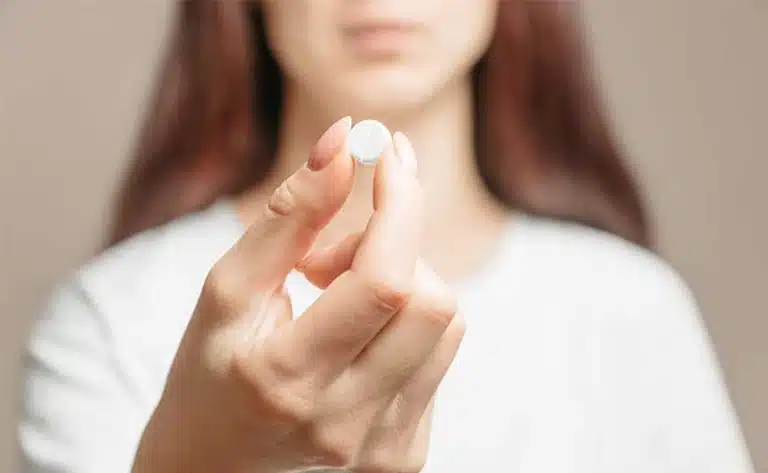Is Trazodone A Controlled Substance?

While trazodone can be abused, it is not a controlled substance according to the Food and Drug Administration (FDA) and the Drug Enforcement Administration (DEA).
Trazodone, brand names Desyrel and Oleptro, is an antidepressant medication and serotonin modulator that’s used to treat major depressive disorder. It can also be prescribed for off-label uses like insomnia, anxiety disorders, and schizophrenia.
Trazodone is only available legally through a prescription from a healthcare provider. It works by acting on receptors in the central nervous system and increasing the activity of serotonin in the brain.
Why Trazodone Isn’t A Controlled Substance
Trazodone is not classified as a controlled substance for several reasons. A controlled substance has a potential for abuse, can lead to dependence and addiction, and is classified as a schedule I, II, III, IV, or V.
Trazodone can be abused like any other drug, but since abuse is not as common and the risk of addiction is very low, the antidepressant has not been classified into a drug schedule category.
That being said, trazodone is still a prescription drug. It can be abused and should only be used if prescribed by your doctor, mental health professional, or other medical professionals.
Since trazodone isn’t a controlled substance, your doctor is not limited to how many pills they can prescribe.
Is Trazodone A Narcotic?
Trazodone is also not considered a narcotic. Narcotics refer to opioid painkillers like codeine, fentanyl, and tramadol, as well as some illicit drugs like heroin.
Since trazodone is not considered an opioid by the DEA or the International Narcotics Control Board, and because it’s a legal drug, it is not a narcotic.
Trazodone Drug Class
Trazodone belongs to a few different drug classes. It is an antidepressant, a serotonin modulator, and a hypnotic.
As an antidepressant, trazodone works by affecting a few of the brain’s neurotransmitters including serotonin, norepinephrine, and histamine.
Since an imbalance of neurotransmitters (especially serotonin) is believed to be the reason for depression, the medication is used to treat that mental health condition.
As a hypnotic, trazodone also works in low doses as a sleep aid to treat insomnia. Although, trazodone is not as effective for insomnia as benzodiazepines like Xanax and Restoril.
Side Effects Of Trazodone
Trazodone can also come with a number of side effects that can range from mild to intense. The most common of these side effects can include:
- drowsiness
- dizziness
- dry mouth
- constipation
- headache
- fatigue
- tingling/numbness in hands, arms, or legs
- blurred vision
- vertigo
- nasal congestion
- shaking
- muscle aches
- low blood pressure
- priapism or prolonged erection
- withdrawal symptoms when you stop use
There is also an increased risk of suicidal thoughts in children and adolescents even when the drug is prescribed for depression.
Additionally, when taking trazodone in high doses, serotonin levels can become too high and lead to serotonin syndrome that can result in effects like irregular heart rate, seizures, unconsciousness, and even death.
Drug Interactions
Trazodone should also not be mixed with certain medications as some mixtures can lead to serious adverse effects. Some of the medications that shouldn’t be used with trazodone include:
- over-the-counter vitamins and nutritional supplements
- anticoagulants/blood thinners
- antifungals
- NSAIDs such as ibuprofen and aspirin
- buspirone
- digoxin
- diuretics
- fentanyl (Actiq and Duragesic)
- lithium
- medications for anxiety
- medications for migraine headaches
- monoamine oxidase inhibitors (MAOIs)
- phenobarbital
- sedatives
- selective serotonin reuptake inhibitors (SSRIs)
- fluoxetine (Prozac)
- paroxetine (Paxil)
- sertraline (Zoloft)
- tranquilizers
- tramadol (Conzip and Ultram)
- tricyclic antidepressants
If you or a loved one struggles with trazodone abuse, inpatient or outpatient rehab programs are available. For information on our addiction treatment options, please contact us today.
Written by Ark Behavioral Health Editorial Team
©2024 Ark National Holdings, LLC. | All Rights Reserved.
This page does not provide medical advice.
Food and Drug Administration (FDA) - TRAZODONE hydrochloride Label
National Library of Medicine: MedlinePlus - Trazodone
Psychopharmacology - Acute behavioral effects and abuse potential of trazodone, zolpidem and triazolam in humans

Questions About Treatment?
Ark Behavioral Health offers 100% confidential substance abuse assessment and treatment placement tailored to your individual needs. Achieve long-term recovery.
100% confidential. We respect your privacy.
Prefer Texting?
Our friendly support team is here to chat 24/7. Opt out any time.







 Learn More
Learn More








